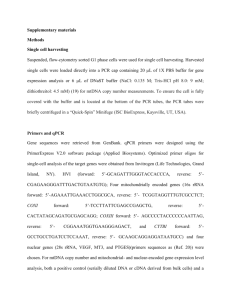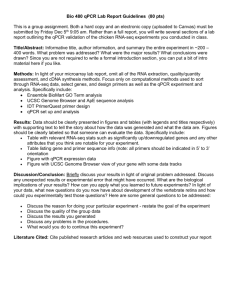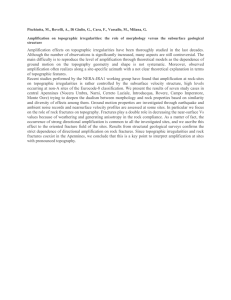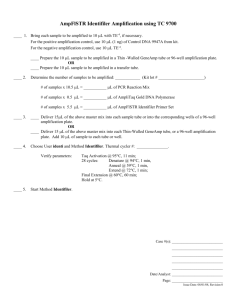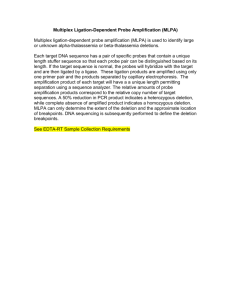Institut für Mikrobiologie, Technische Universität Dresden
advertisement
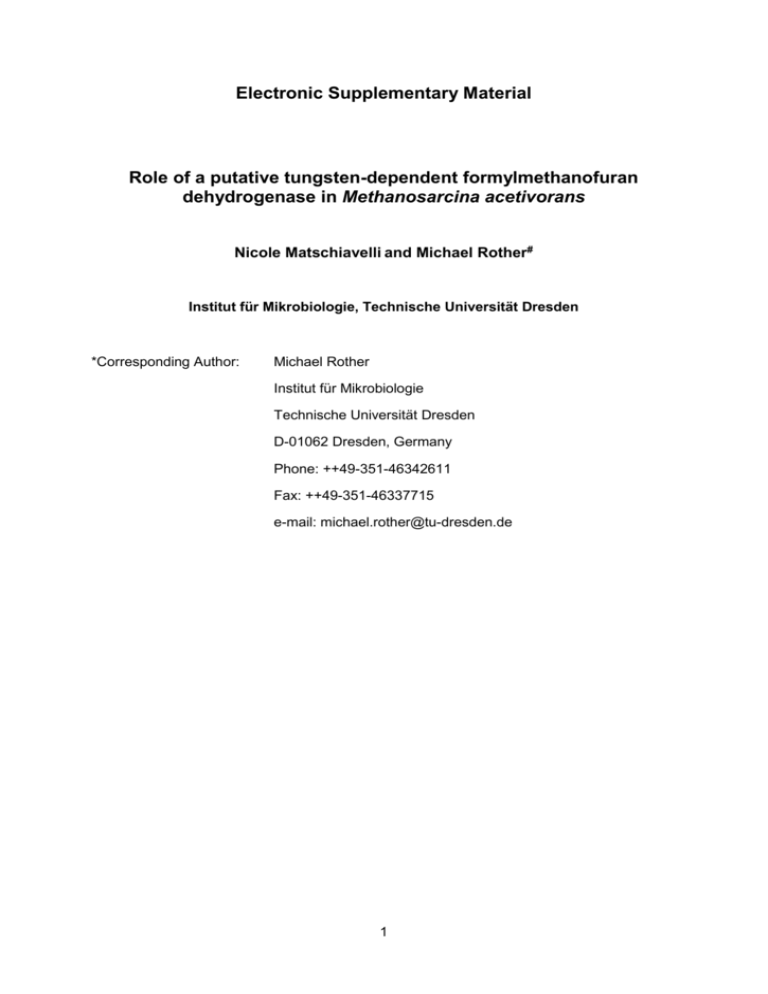
Electronic Supplementary Material Role of a putative tungsten-dependent formylmethanofuran dehydrogenase in Methanosarcina acetivorans Nicole Matschiavelli and Michael Rother# Institut für Mikrobiologie, Technische Universität Dresden *Corresponding Author: Michael Rother Institut für Mikrobiologie Technische Universität Dresden D-01062 Dresden, Germany Phone: ++49-351-46342611 Fax: ++49-351-46337715 e-mail: michael.rother@tu-dresden.de 1 Table S1: Primers used in this study Nr. Primer name Sequence (5`3`)a Use 1 oMA0832_for cgcccatgggcCAGCTCGTAAAACT TTCCCTC Amplification of ma0832 for Antibody generation 2 oMA0832_rev tataagcttCTTTATAAGCAAAACGC CTTTTCC Amplification of ma0832 for Antibody generation 3 odown0832/5' cgattggatccGATAAGATCGAAGTA AACAGAAACTC Amplification of downstream region of ma0832 4 odown0832/3' cagtatactagtggcgcgccCAAATGGC AGAGAACCAGAAC Amplification of downstream region of ma0832 5 oup0835/5‘ ctgactcgaggcgcgccGATGGAGTTC TCAGAATTAAAAGC Amplification of upstream region of ma0835 6 oup0835/3‘ gattacaaagcttGTAACAGAGTTTCG ATAATGAGTTTC Amplification of upstream region of ma0835 7 opET28aSeq-for TACGACTCACTATAGGGG Sequencing of pETma0832 8 opET28aSeq-rev TTAGCAGCCGGATCTCAG Sequencing of pETma0832 9 oP0835/5’ ggaattcgctagcGCATGAAACACAG CAGCAAAAGATAAAAAAC Amplification of promoter region upstream of ma0835 (fwdD1) 10 oP0835/3’ gaattcccatatgAATTCCTCATCTGG GGTGTAACAGAG Amplification of promoter region upstream of ma0835 (fwdD1) 11 oFMD1flank_for AGGTAGCTTCCTACATGTACGG C Amplification of fmdB1 for cloning into pJET1.2 12 oFMD1flank_rev CTGCGTTTTTCTTCCCTGG Amplification of fmdB1 for cloning into pJET1.2 13 oFMD1q_for TTGTGCAGCCTATCTTGCCG qPCR of fmdB1 14 oFMD1q_rev CATTCCATGGCGTCAATGACT qPCR of fmdB1 15 oFMD1cDNA TTCGTAAACTCGAAGGGC cDNA-synthesis of fmdB1 16 oFMD2flank_for CGTTACAATCCGGGAGAATATA CG Amplification of fmdB2 for cloning into pJET1.2 17 oFMD2flank_rev GGTCCGGGAAATTTCGAGTT Amplification of fmdB2 for cloning into pJET1.2 2 18 oFMD2q_for GGTGGGTGCTGACCTTGTAA qPCR of fmdB2 19 oFMD2q_rev ACAACTGTAGTCGGACACAGAG T qPCR of fmdB2 20 oFMD2cDNA ATGGCATCGATAACACCC cDNA-synthesis of fmdB2 21 oFWD1flank_for GACTTCGCCAGAGGATATCCAT A Amplification of fwdB1 for cloning into pJET1.2 22 oFWD1flank_rev TCTCTTCAGTTCCCTGACCTTTG Amplification of fwdB1 for cloning into pJET1.2 23 oFWD1q_for AAGCAGTCAGGCACCTTGC qPCR of fwdB1 24 oFWD1q_rev CCGAGGGGATTACCACGTCT qPCR of fwdB1 25 oFWD1cDNA TTCATGCGGAGGGAAATT cDNA-Synthesis of fwdB1 26 oFWD2flank_for TGTAAAGTTTGAAGACGGTGCC Amplification of fwdB2 for cloning into pJET1.2 27 oFWD2flank_rev TTGAGAACAGCTTCATCCGAG Amplification of fwdB2 for cloning into pJET1.2 28 oFWD2q_for TTTCAAGCCTCCCCAGGTCTAT qPCR of fwdB2 29 oFWD2q_rev GCGTTTCTGGAAGTCAGGGT qPCR of fwdB2 30 oFWD2cDNA AACAACAGGTTTGAAGTCTACC cDNA-Synthesis of fwdB2 31 oMCRbq_for GAGCAGTCCGGTATCTTTGAGA TG qPCR of mcrB 32 oMCRbq_rev CGACATTGTTGGCGTTGAGAC qPCR of mcrB 33 oMCRbcDNA CCGTCCTTTCCATTTTCCT cDNA-Synthesis of mcrB pJET1.2forward CGACTCACTATAGGGAGAGCGG C Sequencing of pJET1.2derivates (Thermo Scientific) 34 Sequencing of pJET1.2derivates (Thermo Scientific) a : lower-case letters correspond to sequences added for cloning purposes; upper-case letters correspond to the target sequence. 35 pJET1.2reverse AAGAACATCGATTTTCCATGGC AG 3 Table S2: Growth of MkoFWD1a. Strains were grown on methanol, acetate or CO, or shifted from methanol to acetate. Growth was monitored by following the optical density at 578 nm (OD578). Methanol Strain Wild type MkoFWD1 td [h]b 8.8 ± final OD578 MethanolAcetate td [d] 1.2 ± 1.8 ± 0.2 0.1 12.8 ± 1.2 ± 2.7 ± 0.6 0.3 0.1 0.8 final OD578 0.7 ± 0.1 0.7 ± 0.1 Acetate td [h]b final OD578 CO td [h]b final OD578 38.5 0.7 ± 11.0 ± 1.1 ± ± 1.7 0.02 1.6 0.1 40.7 0.7 ± 43.8 ± 0.9 ± ± 2.1 0.01 2.6 0.1 a: shown are average values and standard deviations of six independent cultures for each strain; the experiment was qualitatively reproduced at least once. b: doubling time Table S3: Substrate-dependent metabolite formation from CO. Wild type and MkoFWD1 was cultivated on methanol, acetate, or CO before cell suspensions were made. The initial formation rates of methane, acetate and formate from 50 kPa CO were analyzed. Strain Wild type MkoFWD1 a Growth substrate Formation rate [nmol min-1 mg-1] Methane Formate Acetate Methanol 10.9 ± 2.7 0.4 ± 0.3 0.9 ± 0.1 CO 5.4 ± 1.3 1.2 ± 0.1 9.5 ± 1.3 Acetate 1.0 ± 0.5 4.0 ± 0.4 0.03 ± 0.02 Methanol 6.9 ± 2.9 n.d. a n.d. a CO 5.6 ± 1.6 n.d. a 2.6 ± 0.9 Acetate 0.2 ± 0.07 n.d. a n.d. a n.d.: not detected (below detection limit of the respective system, ca. 10 µM). 4 b a 1 2 3 4 kb 1 2 kDa 10 170 6 100 4 55 3 40 35 2 25 1.5 15 Figure S1: Verification of MkoFWD1. A, genotype of MkoFWD1 analyzed by southern hybridization; a ca. 1000 bp DIG-labeled DNA-fragment corresponding to the region downstream of the putative fwd1 operon was used to probe genomic DNA from the wild type (lane 1) and MkoFWD1 (clone #4, lane 2; clone #5, lane3), restricted over night with HpaI; a DIG-labeled DNA ladder (Roche, lane 4) served as standard; B, immunological analysis of M. acetivorans wild type (lane 1) and of MkoFWD1 (lane 2), grown on methanol using FwdC1-specific polyclonal antiserum (1:5000); the arrow indicates the migration position of FwdC1. 5
